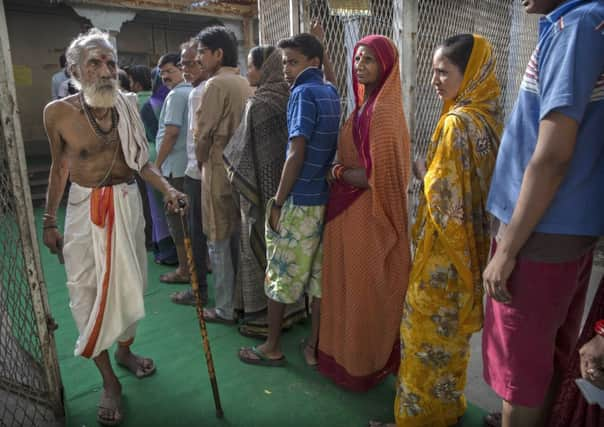Divisive Hindu nationalist set to be Indian PM


Opinion polls almost unanimously forecast his Hindu nationalist Bhartiya Janata Party (BJP) would emerge as the largest party when votes are tallied on Friday to fill 543 seats in the Lok Sabha, or House of the People.
India’s rupee and stocks surged as investors bet the 63-year-old would usher in a stable government focused on reviving Asia’s third-largest economy.
Advertisement
Hide AdAdvertisement
Hide AdThe right-wing BJP has run on a platform of pro-business policies and Hindu nationalism.
The ruling centre-left Congress party that has led India for the past decade became marred by corruption and scandals. Incumbent premier Dr Manmohan Singh, a respected economist, is retiring at 81.
The final stage to elect 41 parliamentary seats marks the end of what is thought to be the world’s largest-ever democratic election.
One survey by India Today put the BJP on 56 per cent. But accurately polling India’s diverse, 815 million-strong electorate is notoriously difficult, and exit polls were dramatically wrong in the past two general elections, over-estimating the number of seats won by the BJP.
Mr Modi is the first prime ministerial candidate to stand in Varanasi, a 3,000-year-old city built around the river Ganges where several religions mingle but which is best known for the Hindu belief that to die there allows souls to escape the cycle of reincarnation.
It was widely seen as a bid to consolidate his credentials as part of the Hindu nationalist movement that sees India as primarily a Hindu nation.
“My brothers in Varanasi, let us vote peacefully, we are all one,” Mr Modi said in a recorded address broadcast yesterday, appealing for calm after a heated campaign that was marred by several outbreaks of violence.
His critics see him as a hardliner, even though he has campaigned mainly on his record of job creation and economic management while running Gujarat state for the past 12 years.
Advertisement
Hide AdAdvertisement
Hide AdThe election has been marred by massacres of Muslims in the state of Assam that political rivals linked to speeches by Mr Modi calling for illegal immigrants from Bangladesh to be expelled from India. The BJP denied the speeches were inflammatory.
A triumph in Varanasi, in Uttar Pradesh state, would cap a gruelling, campaign by Mr Modi to lead the BJP back to power after a decade in opposition.
A sharp economic slowdown has sapped the popularity of Congress, which has promised to extend welfare policies that helped it win five years ago.
Buoyed by reports from the field, BJP leaders said they and their allies might win a record 300 seats, more than the 272 needed for an overall majority.
However, polls falsely predicted the BJP would win in 2004.
If Mr Modi does fall short, not only might he miss out on the premiership, but India would also face uncertain negotiations to form a coalition government that – even if led by the BJP – could fall hostage to the demands of regional parties.
Varanasi’s Muslim population is solidly against Mr Modi because of memories of sectarian riots in Gujarat in 2002, in which more than 1,000 people were killed, mostly Muslims.
“We can never forget or forgive Narendra Modi for his role in the Gujarat riots against the Muslims. We recognise him only as a perpetrator of the riots and as a danger to the country,” said Mohammad Sabir Falahi, head of the Varanasi branch of the Muslim Jamaat-e-Islami Hind group.